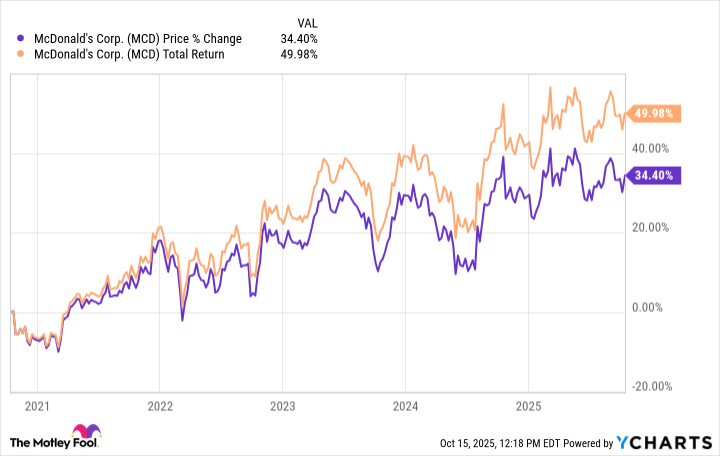Dividend Kings attain that status by maintaining a streak of annual dividend increases for at least 50 years. With more than 10,000 stocks currently trading on the U.S. market, it is rare that a company attains this status; currently, only 56 have.
Still, a few other stocks are on the verge of becoming Dividend Kings. This includes a notable name from the consumer sector, and thanks to its approach, it is just two payout hikes away from achieving that status.
The next consumer-focused Dividend King
In the consumer market, the next one on track to reach this point is McDonald's (MCD 0.90%). The fast-food giant offered its first dividend in 1976 and has increased its payout every year since.
Its last increase, which occurred late last year, took its dividend to $7.08 per share, a 6% increase from the previous year. Shareholders who invest now will earn a dividend yield of about 2.3%, nearly double the 1.2% average for the S&P 500. For longer-term shareholders, the yield is significantly higher due to the rising dividend.
Moreover, this is around the time when the company typically announces payout hikes. Assuming that trend holds, the upcoming increase will be the 49th, and another boost in the fall of 2026 would make McDonald's a Dividend King.
Also, the payout appears sustainable. Over the trailing 12 months, the company distributed $4.66 billion to shareholders in the form of dividends. During that time, it generated $6.90 billion in free cash flow, leaving $2.24 billion for share repurchases or investments in its business.
The dividend is a significant source of returns in owning McDonald's stock. Over the last five years, the share price has risen by about 35%. Thanks to the dividend, the total returns amounted to around 50% during that time.
Still, the more conservative approach may come at a cost. Even though shareholders made significant gains during that time, the S&P 500 had a total return of 105%. McDonald's has far outperformed the index since 1990, boosting its longest-term shareholders, but the company's huge size may mean slower percentage growth from here.
How McDonald's does it
Dividend investors will also like that McDonald's business strategy leaves it in position to generate strong free cash flow. Just under 95% of the company's 44,000 locations are franchises. The company charges new franchisees an initial fee, as well as costs associated with building and launching the restaurant.
McDonald's owns these restaurant buildings, making the company one of the world's most notable landowners. It will then collect between 4% and 5% of sales in royalties and a 4% marketing fee, along with other annual fees.
Since many of these costs are fixed, the company is less affected by economic fluctuations that may impact sales. That has likely helped put it in position to hike its dividend even in some of the worst economies.
McDonald's as a Dividend King
McDonald's is on track to attain Dividend King status by late next year, and more importantly, it is in a strong position to hold it.
Its size may slow its growth in the future, which might make it a less desirable holding except for longer-term and income-focused investors.
Nonetheless, the company's franchise-focused business model boosts investors and brings a steady source of revenue, even in more challenging times. That should keep its free cash flow steady and allow it to afford its payout and future increases.
As long as McDonald's remains a desirable choice for franchise owners and customers, its attainment of Dividend King status should bolster the consumer discretionary stock's appeal to income investors.






